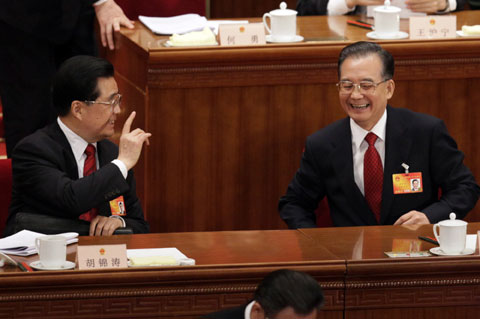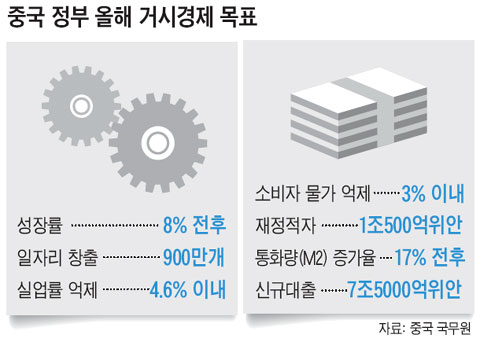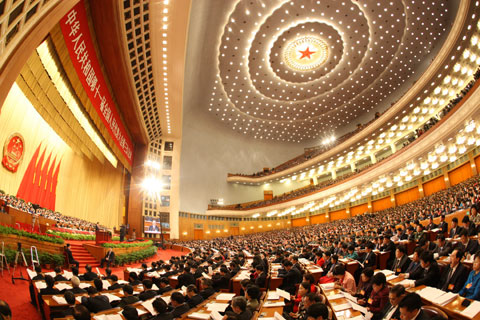 |
|
Chinese Premier Wen Jiabao delivers a government work report during the opening meeting of the Third Session of the 11th National People's Congress (NPC) at the Great Hall of the People in Beijing, capital of China, March 5, 2010. (Xinhua/Liu Weibing)
|
by Xinhua writers Wang Yaguang, Chen Yongrong and Liu Jie
BEIJING, March 5 (Xinhua) -- China expects its economy to grow around 8 percent in 2010 from a year earlier, said Premier Wen Jiabao at the annual parliament session Friday, expecting a "crucial but complicated" year for economic recovery.
Setting the 8-percent target mainly "aims at ensuring the quality of economic growth, focusing on transformation of economic growth pattern and adjustment of economic structure," said Wen in his government work report to the National People's Congress (NPC).
The increase of consumer price index, a main gauge of the country's inflation, will be held around 3 percent, the premier said.
Although the development environment this year may be better than 2009, China "will still face a complicated situation," Wen said.
The year of 2010 will be a "crucial but complicated" year for China's economic development as the country will continue fighting against the global financial crisis while maintaining a stable and comparatively fast economic growth and accelerating transformation of growth pattern, he said.
Observers, however, said they are sure China will hit the growth target.
"I'm sure China will surpass the 8-percent growth target this year as its industry engine is very strong and the country has recovered from the financial crisis," said Lars Backstrom, Ambassador of Finland in China.
The diplomat was echoed by Peter Trebitsch, a reporter from Hungarian News Agency Corporation. "If China sets 8-percent, it will be," he said.
Zhuang Jian, senior economist with the Asia Development Bank, noted that last year China flexed its entire muscle to meet its eight percent target amid the most difficult year for economic growth, but this year, the goal will be achieved at ease as international and domestic conditions emerge from the worst time.
He also said the new target demonstrates the resolution of the Chinese government to shift its development focus from quantity to quality.
"Growth is not a priority. Even nine percent or ten percent of growth are within reach in the short-term, but that is no longer desirable since China has learnt from the financial crisis that the previous model is not sustainable," Zhuang said.
Peter Trebitsch also noticed China is giving more attention to quality of growth, instead of only focusing on expansion.
The key of economic development pattern transformation, however, lies in implementation of policies in lower level governments, he said.
As the first country emerging from the global economic downturn, China's gross domestic product (GDP) rose 8.7 percent in 2009 from a year earlier, above the 8-percent target the government set at the beginning of last year.
China's quarterly economic growth accelerated as the government's economic stimulus package started to pay off. The national economy rose 6.2 percent in the first quarter last year, 7.9 percent in the second quarter, 9.1 percent in the third and 10.7 percent in the fourth.
"Considering the circumstances that many countries are still suffering considerably, the target of 8 percent growth can leave room for Chinese people to improve their living standards," said Francois Jackman, counselor with Embassy of Barbados in China.
FACTBOX: Key figures in government work report by Premier Wen
Highlights of Premier Wen's government work report
Special Report: NPC, CPPCC Annual Sessions 2010













 06151 서울 강남구 테헤란로 309, 1205호 (삼성제일빌딩)
06151 서울 강남구 테헤란로 309, 1205호 (삼성제일빌딩)